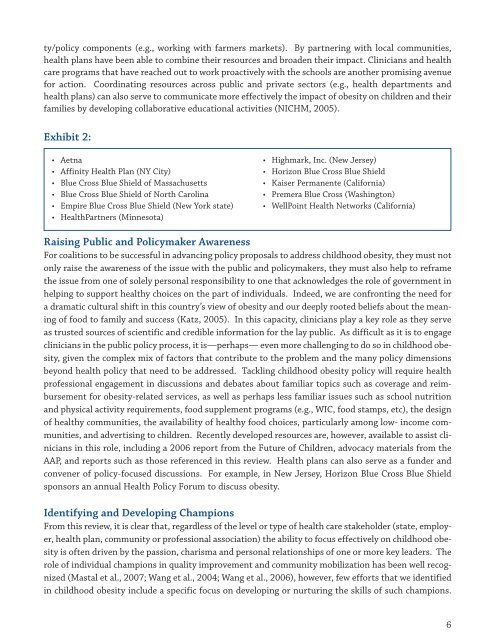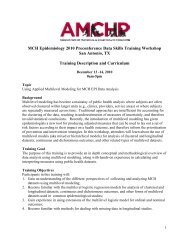Childhood Obesity: The Role of Health Policy - Association of ...
Childhood Obesity: The Role of Health Policy - Association of ...
Childhood Obesity: The Role of Health Policy - Association of ...
Create successful ePaper yourself
Turn your PDF publications into a flip-book with our unique Google optimized e-Paper software.
ty/policy components (e.g., working with farmers markets). By partnering with local communities,<br />
health plans have been able to combine their resources and broaden their impact. Clinicians and health<br />
care programs that have reached out to work proactively with the schools are another promising avenue<br />
for action. Coordinating resources across public and private sectors (e.g., health departments and<br />
health plans) can also serve to communicate more effectively the impact <strong>of</strong> obesity on children and their<br />
families by developing collaborative educational activities (NICHM, 2005).<br />
Exhibit 2:<br />
• Aetna<br />
• Affinity <strong>Health</strong> Plan (NY City)<br />
• Blue Cross Blue Shield <strong>of</strong> Massachusetts<br />
• Blue Cross Blue Shield <strong>of</strong> North Carolina<br />
• Empire Blue Cross Blue Shield (New York state)<br />
• <strong>Health</strong>Partners (Minnesota)<br />
• Highmark, Inc. (New Jersey)<br />
• Horizon Blue Cross Blue Shield<br />
• Kaiser Permanente (California)<br />
• Premera Blue Cross (Washington)<br />
• WellPoint <strong>Health</strong> Networks (California)<br />
Raising Public and <strong>Policy</strong>maker Awareness<br />
For coalitions to be successful in advancing policy proposals to address childhood obesity, they must not<br />
only raise the awareness <strong>of</strong> the issue with the public and policymakers, they must also help to reframe<br />
the issue from one <strong>of</strong> solely personal responsibility to one that acknowledges the role <strong>of</strong> government in<br />
helping to support healthy choices on the part <strong>of</strong> individuals. Indeed, we are confronting the need for<br />
a dramatic cultural shift in this country’s view <strong>of</strong> obesity and our deeply rooted beliefs about the meaning<br />
<strong>of</strong> food to family and success (Katz, 2005). In this capacity, clinicians play a key role as they serve<br />
as trusted sources <strong>of</strong> scientific and credible information for the lay public. As difficult as it is to engage<br />
clinicians in the public policy process, it is—perhaps— even more challenging to do so in childhood obesity,<br />
given the complex mix <strong>of</strong> factors that contribute to the problem and the many policy dimensions<br />
beyond health policy that need to be addressed. Tackling childhood obesity policy will require health<br />
pr<strong>of</strong>essional engagement in discussions and debates about familiar topics such as coverage and reimbursement<br />
for obesity-related services, as well as perhaps less familiar issues such as school nutrition<br />
and physical activity requirements, food supplement programs (e.g., WIC, food stamps, etc), the design<br />
<strong>of</strong> healthy communities, the availability <strong>of</strong> healthy food choices, particularly among low- income communities,<br />
and advertising to children. Recently developed resources are, however, available to assist clinicians<br />
in this role, including a 2006 report from the Future <strong>of</strong> Children, advocacy materials from the<br />
AAP, and reports such as those referenced in this review. <strong>Health</strong> plans can also serve as a funder and<br />
convener <strong>of</strong> policy-focused discussions. For example, in New Jersey, Horizon Blue Cross Blue Shield<br />
sponsors an annual <strong>Health</strong> <strong>Policy</strong> Forum to discuss obesity.<br />
Identifying and Developing Champions<br />
From this review, it is clear that, regardless <strong>of</strong> the level or type <strong>of</strong> health care stakeholder (state, employer,<br />
health plan, community or pr<strong>of</strong>essional association) the ability to focus effectively on childhood obesity<br />
is <strong>of</strong>ten driven by the passion, charisma and personal relationships <strong>of</strong> one or more key leaders. <strong>The</strong><br />
role <strong>of</strong> individual champions in quality improvement and community mobilization has been well recognized<br />
(Mastal et al., 2007; Wang et al., 2004; Wang et al., 2006), however, few efforts that we identified<br />
in childhood obesity include a specific focus on developing or nurturing the skills <strong>of</strong> such champions.<br />
6



